Dacia Jogger vs Kia Stonic - Differences and prices compared
Costs and Efficiency:
When it comes to price and running costs, the biggest differences usually appear. This is often where you see which car fits your budget better in the long run.
Dacia Jogger has a noticeable advantage in terms of price – it starts at 15400 £, while the Kia Stonic costs 20100 £. That’s a price difference of around 4714 £.
Fuel consumption also shows a difference: Dacia Jogger manages with 4.70 L and is therefore slightly more efficient than the Kia Stonic with 5.60 L. The difference is about 0.90 L per 100 km.
Engine and Performance:
Under the bonnet, it becomes clear which model is tuned for sportiness and which one takes the lead when you hit the accelerator.
When it comes to engine power, the Dacia Jogger has a somewhat edge – offering 140 HP compared to 115 HP. That’s roughly 25 HP more horsepower.
In acceleration from 0 to 100 km/h, the Dacia Jogger is minimal quicker – completing the sprint in 9.80 s, while the Kia Stonic takes 10.70 s. That’s about 0.90 s faster.
In terms of top speed, the Kia Stonic performs minimal better – reaching 182 km/h, while the Dacia Jogger tops out at 174 km/h. The difference is around 8 km/h.
There’s also a difference in torque: pulls stronger with compared to . That’s about difference.
Space and Everyday Use:
Cabin size, boot volume and payload all play a role in everyday practicality. Here, comfort and flexibility make the difference.
Seats: Dacia Jogger offers clearly perceptible more seating capacity – 7 vs 5.
In curb weight, Kia Stonic is minimal lighter – 1205 kg compared to 1251 kg. The difference is around 46 kg.
In terms of boot space, the Dacia Jogger offers clearly more room – 607 L compared to 352 L. That’s a difference of about 255 L.
In maximum load capacity, the Dacia Jogger performs clearly perceptible better – up to 1819 L, which is about 664 L more than the Kia Stonic.
When it comes to payload, Dacia Jogger clearly perceptible takes the win – 582 kg compared to 445 kg. That’s a difference of about 137 kg.
Who wins the race?
The Dacia Jogger proves to be wins the duel decisively and therefore becomes our DriveDuel Champion!
Dacia Jogger is the better all-rounder in this comparison.
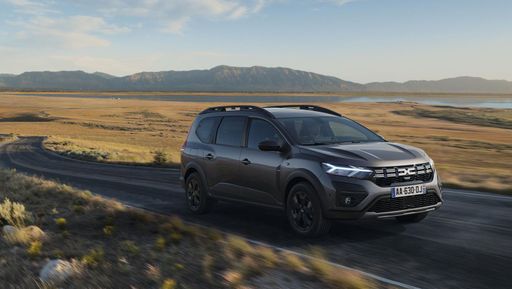 @ Dacia / Renault Group Media
@ Dacia / Renault Group Media
Dacia Jogger
Costs and Consumption
View detailed analysis
Engine and Performance
View detailed analysis
Dimensions and Body
View detailed analysis
Dacia Jogger
The Dacia Jogger is a no-nonsense family mover that stretches the idea of value with cavernous practicality and flexible space, perfect for buyers who need a sensible, everyday Swiss Army knife on wheels. It doesn’t try to be glamorous — instead it wins hearts with cheerful thrift, durable materials and honest engineering, giving you useful transport without the pretence.
details @ Dacia / Renault Group Media
@ Dacia / Renault Group Media
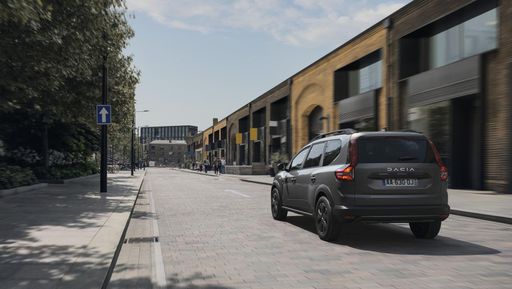 @ Dacia / Renault Group Media
@ Dacia / Renault Group Media
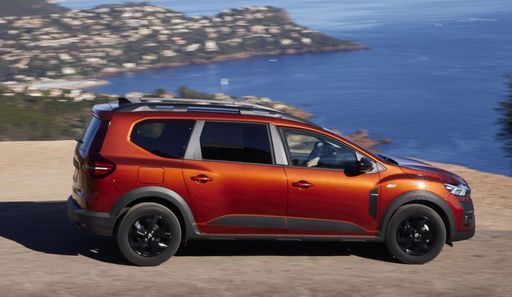 @ Dacia / Renault Group Media
@ Dacia / Renault Group Media
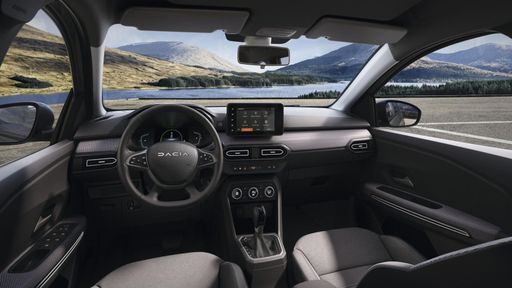 @ Dacia / Renault Group Media
@ Dacia / Renault Group Media
Kia Stonic
The Kia Stonic is a sprightly compact crossover that mixes city-friendly agility with a cheeky, modern design — perfect for buyers who want style without sacrificing sense. Inside it serves up clever practicality and a bright, well-equipped cabin, making everyday driving feel a bit more fun than it has any right to be.
details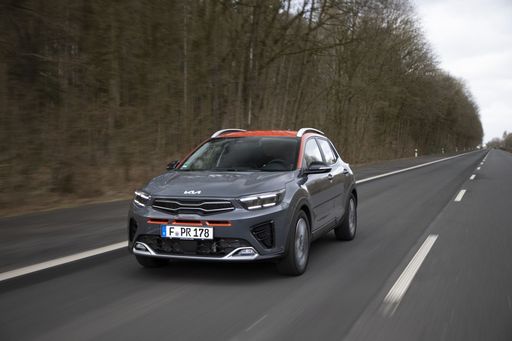 @ Kia Corporation
@ Kia Corporation
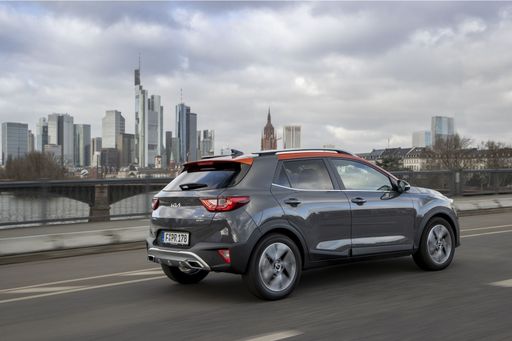 @ Kia Corporation
@ Kia Corporation
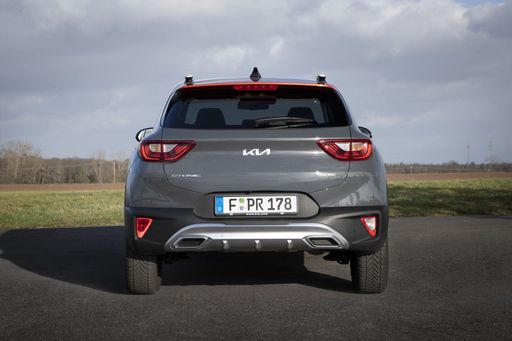 @ Kia Corporation
@ Kia Corporation
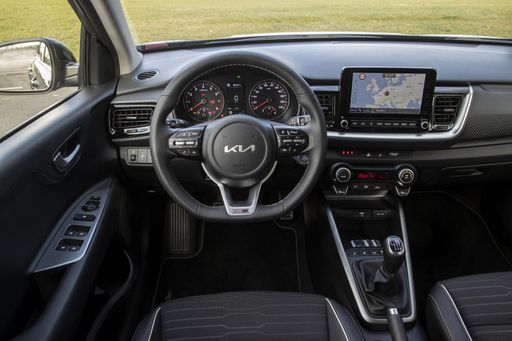 @ Kia Corporation
@ Kia Corporation
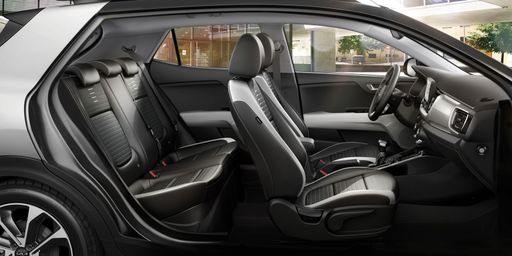 @ Kia Corporation
@ Kia Corporation
 @ Dacia / Renault Group Media
@ Dacia / Renault Group Media
|
 @ Kia Corporation
@ Kia Corporation
|
|
|
|
Costs and Consumption |
|
|---|---|
|
Price
15400 - 23400 £
|
Price
20100 - 26600 £
|
|
Consumption L/100km
4.7 - 7.8 L
|
Consumption L/100km
5.6 - 5.9 L
|
|
Consumption kWh/100km
-
|
Consumption kWh/100km
-
|
|
Electric Range
-
|
Electric Range
-
|
|
Battery Capacity
0.60 kWh
|
Battery Capacity
-
|
|
co2
105 - 137 g/km
|
co2
127 - 133 g/km
|
|
Fuel tank capacity
40 - 50 L
|
Fuel tank capacity
45 L
|
Dimensions and Body |
|
|---|---|
|
Body Type
MPV
|
Body Type
SUV
|
|
Seats
5 - 7
|
Seats
5
|
|
Doors
5
|
Doors
5
|
|
Curb weight
1251 - 1460 kg
|
Curb weight
1205 - 1270 kg
|
|
Trunk capacity
160 - 607 L
|
Trunk capacity
352 L
|
|
Length
4547 mm
|
Length
4165 mm
|
|
Width
1784 mm
|
Width
1760 mm
|
|
Height
1674 mm
|
Height
1520 mm
|
|
Max trunk capacity
1807 - 1819 L
|
Max trunk capacity
1155 L
|
|
Payload
393 - 582 kg
|
Payload
440 - 445 kg
|
Engine and Performance |
|
|---|---|
|
Engine Type
Full Hybrid, LPG, Petrol
|
Engine Type
Petrol, Petrol MHEV
|
|
Transmission
Automatic, Manuel
|
Transmission
Manuel, Automatic
|
|
Transmission Detail
Automatic Gearbox, Manual Gearbox
|
Transmission Detail
Manual Gearbox, Dual-Clutch Automatic
|
|
Drive Type
Front-Wheel Drive
|
Drive Type
Front-Wheel Drive
|
|
Power HP
91 - 140 HP
|
Power HP
100 - 115 HP
|
|
Acceleration 0-100km/h
9.8 - 13.2 s
|
Acceleration 0-100km/h
10.7 - 12.1 s
|
|
Max Speed
167 - 174 km/h
|
Max Speed
179 - 182 km/h
|
|
Torque
160 - 200 Nm
|
Torque
172 - 200 Nm
|
|
Number of Cylinders
3 - 4
|
Number of Cylinders
3
|
|
Power kW
67 - 103 kW
|
Power kW
74 - 85 kW
|
|
Engine capacity
999 - 1598 cm3
|
Engine capacity
998 cm3
|
General |
|
|---|---|
|
Model Year
2024 - 2025
|
Model Year
2025
|
|
CO2 Efficiency Class
C, D
|
CO2 Efficiency Class
D
|
|
Brand
Dacia
|
Brand
Kia
|
What drivetrain options does the Dacia Jogger have?
The Dacia Jogger is offered with Front-Wheel Drive.
The prices and data displayed are estimates based on German list prices and may vary by country. This information is not legally binding.
